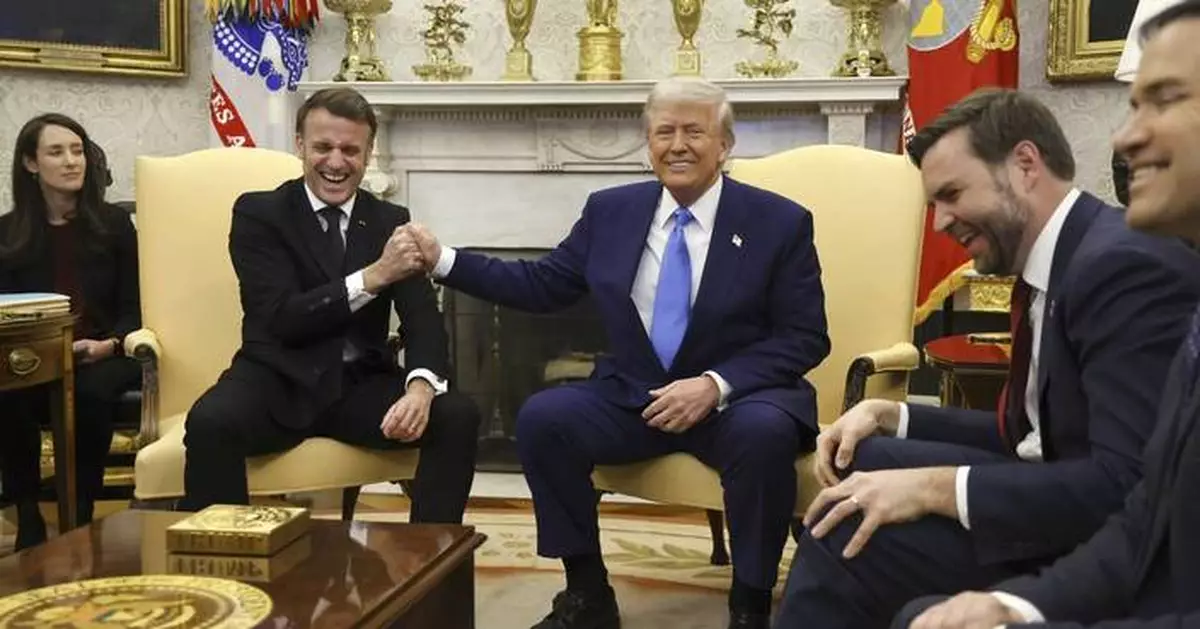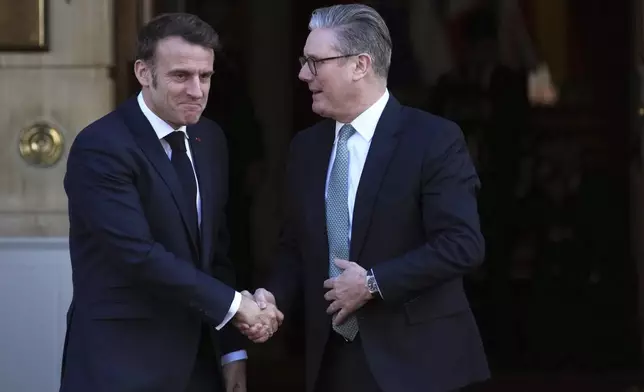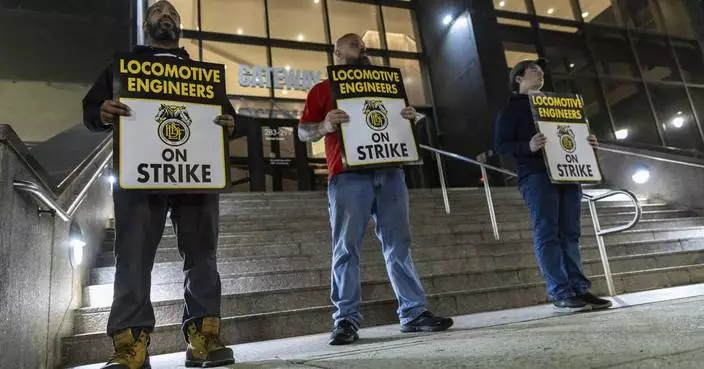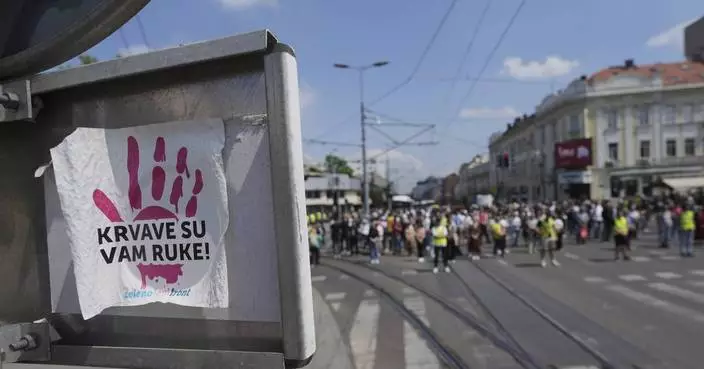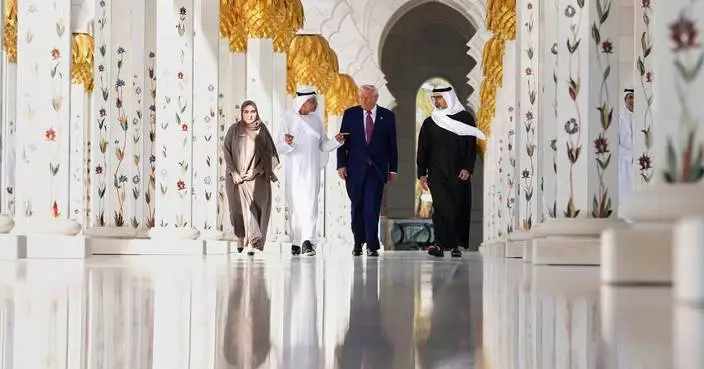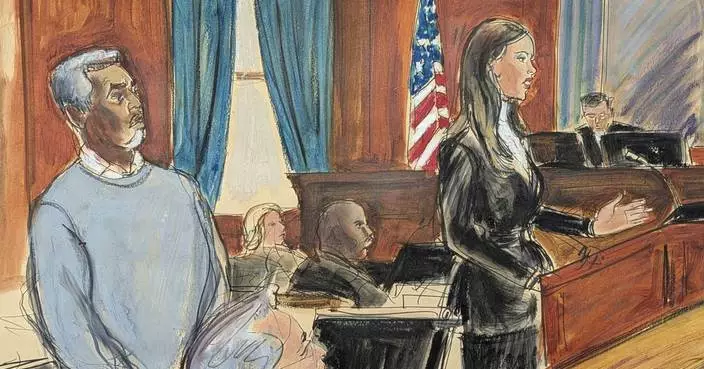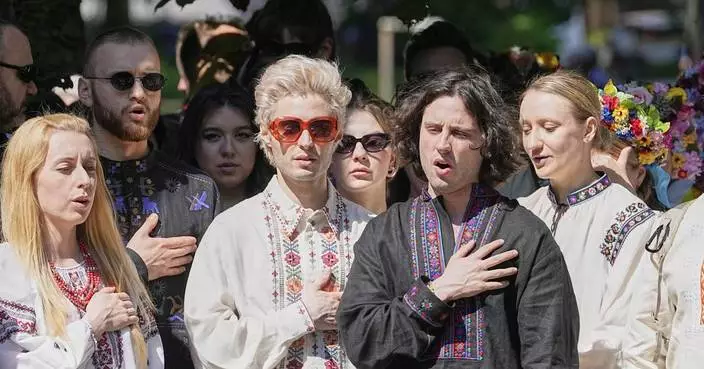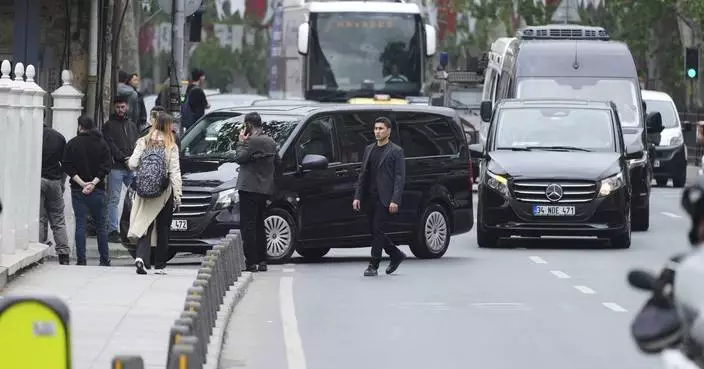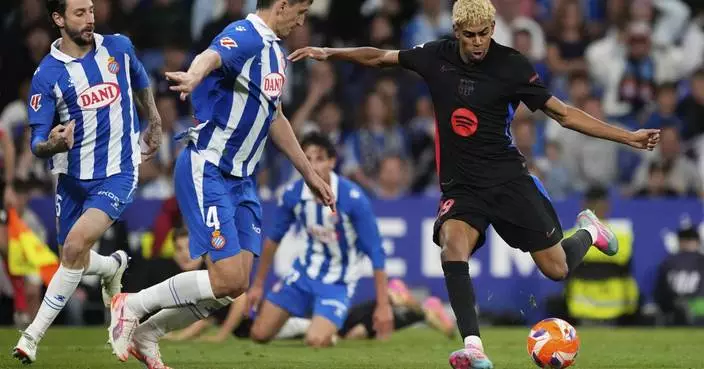PARIS (AP) — French President Emmanuel Macron is back at the center of global diplomacy, seeking to ease relations with President Donald Trump, championing a Ukraine peace plan alongside his British counterpart, and seeing his longstanding desire to boost European defense turning into reality.
Six months ago, Macron seemed weaker than ever after his call for early legislative elections produced a hung parliament, sparking an unprecedented crisis. Known for his nonstop political activism, Macron shifted his focus to foreign policy, leaving domestic struggles largely to the prime minister.
Click to Gallery
Britain's Prime Minister Keir Starmer, right, greets French President Emmanuel Macron as he arrives for a summit on Ukraine at Lancaster House in London, Sunday, March 2, 2025. (AP Photo/Christophe Ena, Pool)
Ukraine's President Volodymyr Zelenskyy, left, meets French President Emmanuel Macron on the sidelines of the European Council to discuss continued support for Ukraine and European defense, in Brussels, Thursday, March 6, 2025. (Ludovic Marin, Pool via AP)
French President Emmanuel Macron speaks during a media conference at an EU Summit in Brussels, Thursday, March 6, 2025. (AP Photo/Omar Havana)
FILE - French President Emmanuel Macron speaks during a media conference at an EU Summit in Brussels, Thursday, March 6, 2025. (AP Photo/Omar Havana, File)
Ukraine's President Volodymyr Zelenskyy, left, meets French President Emmanuel Macron on the sidelines of the European Council to discuss continued support for Ukraine and European defense, in Brussels, Thursday, March 6, 2025. (Ludovic Marin, Pool via AP)
President Donald Trump, right, shakes the hand of France's President Emmanuel Macron during a joint press conference in the East Room of the White House in Washington, Monday, Feb. 24, 2025. (Ludovic Marin/Pool via AP)
France's President Emmanuel Macron, from second left, speaks with President Donald Trump as Vice President JD Vance and Secretary of State Marco Rubio react during a meeting in the Oval Office of the White House in Washington, Monday, Feb. 24, 2025. (Ludovic Marin/Pool via AP)
Now, he appears as the one leader who speaks to Trump several times per week and takes the lead in European support for Ukraine, while positioning himself as the commander-in-chief of the European Union’s only nuclear power.
Macron, 47, is one of the few leaders who knew Trump during his first term in office, maintaining despite disagreements a cordial relationship, which both describe as “friendship.”
He was the first European leader to visit Trump since his reelection, seeking to persuade him not to abandon Ukraine in pursuit of a peace deal with Russia.
Macron is also a heavyweight of European politics, and shifting U.S. policies gave momentum to his longstanding views.
Since he was first elected in 2017, Macron has pushed for a stronger, more sovereign Europe. That same year, in a sweeping speech at Sorbonne University, he called for a common European defense policy, with increased military cooperation and joint defense initiatives.
He later lamented the “brain death” of the NATO military alliance, insisting the EU should step up and start acting as a strategic world power.
On Thursday, EU leaders committed to strengthening defenses and freeing up hundreds of billions of euros for security in the wake of Trump’s warnings that they might face the Russian threat alone.
In a resounding declaration last week, Macron announced he would discuss extending France’s nuclear deterrent to European partners to help protect the continent.
France's nuclear power is inherited from the strategy set by wartime hero Gen. Charles de Gaulle, president from 1958 to 1969, who sought to maintain France’s independence from the U.S. and assert the country's role as a global power. That went through the development of an independent French nuclear arsenal.
Poland and Baltic nations welcomed the proposal.
France's Minister for European affairs Benjamin Haddad praised Macron's efforts, saying they were aimed at ensuring that "in the face of this world upheaval, Europeans are not spectators but players.”
Some other key players appear to back Macron's approach.
British Prime Minister Keir Starmer, in office for eight months, has sought closer defense cooperation with Europe as part of a “reset” with the EU after years of bitterness over Brexit.
Macron and Starmer are now spearheading a desperate diplomatic drive to bolster Ukraine’s defenses, drawing up a peace plan with Kyiv at its core. That plan includes the possibility of sending European troops to Ukraine to enforce a potential peace agreement.
Meanwhile, Germany's conservative election winner Friedrich Merz said his top priority would be to “strengthen Europe as soon as possible” and gradually move toward “real independence” from the U.S.
Only three days after his victory last month, Merz, who has called for a discussion on “nuclear sharing” with France, traveled to Paris for a working dinner with Macron.
No statement was released after the meeting, but French officials with knowledge of the matter said both men's visions for Europe align. They spoke anonymously because the talks were not to be made public.
Russia’s foreign ministry accused Macron of "demonstrative militarism dictated by the domestic agenda.”
The ministry said that Macron seeks to distract the French public from “worsening socio-economic problems in France and the European Union."
Moscow dismissed Macron’s nuclear deterrent offer as “extremely confrontational,” saying the remarks reflected Paris’ ambitions to “become the nuclear ‘patron’ of all of Europe,” despite the fact that France’s nuclear forces are far smaller than those of the U.S.
Russian President Vladimir Putin drew a comparison with Napoleon, saying that some people “want to return to the times of Napoleon, forgetting how it ended” — a reference to the emperor’s failed invasion of Russia in 1812. Macron responded by calling Putin “an imperialist.”
Reelected in 2022, Macron last year struggled not to become a lame duck after his call for early legislative elections led to a chaotic situation in parliament, delaying the approval of the state budget and forcing the quick replacement of the prime minister.
However, the French Constitution grants the president some substantial powers over foreign policy, European affairs and defense. Macron has a presidential mandate until 2027 and he has said he won't step down before the end of his term.
Macron's activism on the global stage drew criticism from opposition leaders.
Far-right National Rally party vice president Sébastien Chenu described Macron’s “moody” character as “one of the biggest issues” for French diplomacy. "He offended many people, he often changed his mind,” Chenu said.
The head of the hard-left France Unbowed group at the National Assembly, Mathilde Panot, also voiced concerns.
“The situation is too serious and the President of the Republic is too weakened for him to decide on his own," she said. "We don’t just want to be consulted. ... It’s up to the parliament to decide on such serious issues.”
Associated Press writer Vladimir Isachenkov in Moscow contributed to the story.

Britain's Prime Minister Keir Starmer, right, greets French President Emmanuel Macron as he arrives for a summit on Ukraine at Lancaster House in London, Sunday, March 2, 2025. (AP Photo/Christophe Ena, Pool)
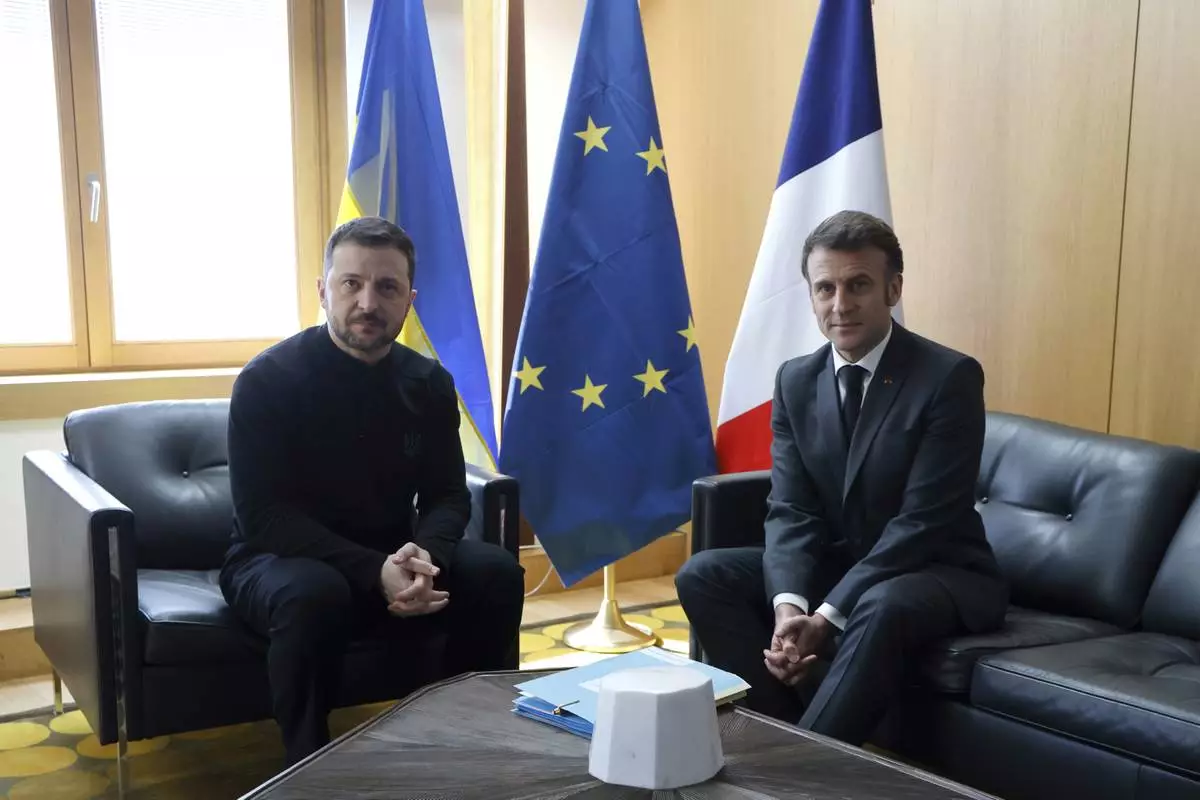
Ukraine's President Volodymyr Zelenskyy, left, meets French President Emmanuel Macron on the sidelines of the European Council to discuss continued support for Ukraine and European defense, in Brussels, Thursday, March 6, 2025. (Ludovic Marin, Pool via AP)
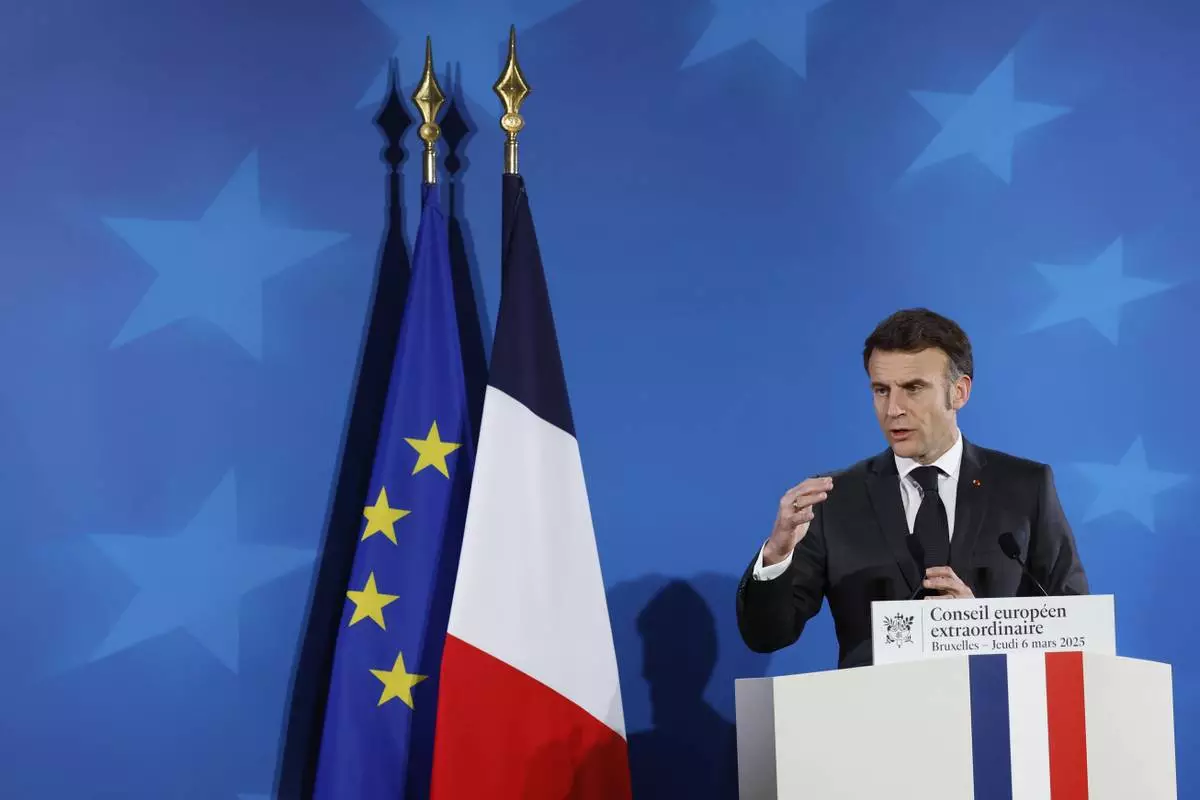
French President Emmanuel Macron speaks during a media conference at an EU Summit in Brussels, Thursday, March 6, 2025. (AP Photo/Omar Havana)
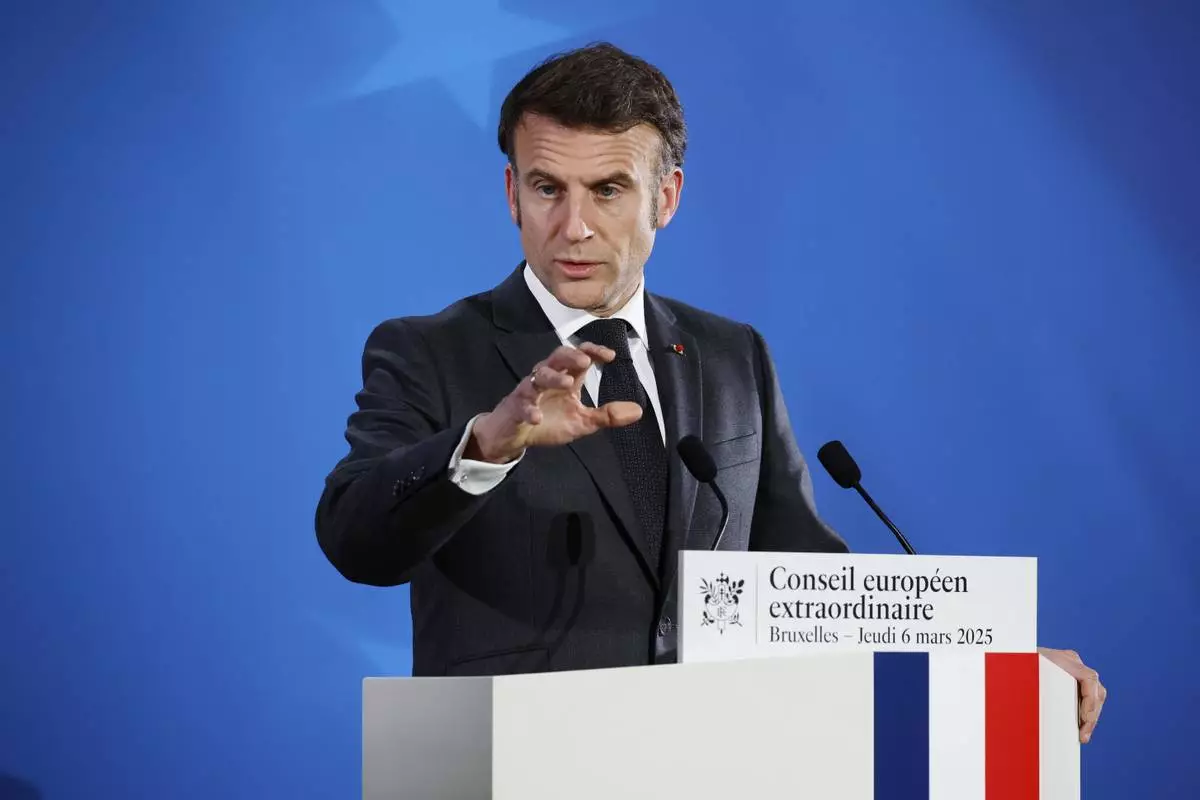
FILE - French President Emmanuel Macron speaks during a media conference at an EU Summit in Brussels, Thursday, March 6, 2025. (AP Photo/Omar Havana, File)
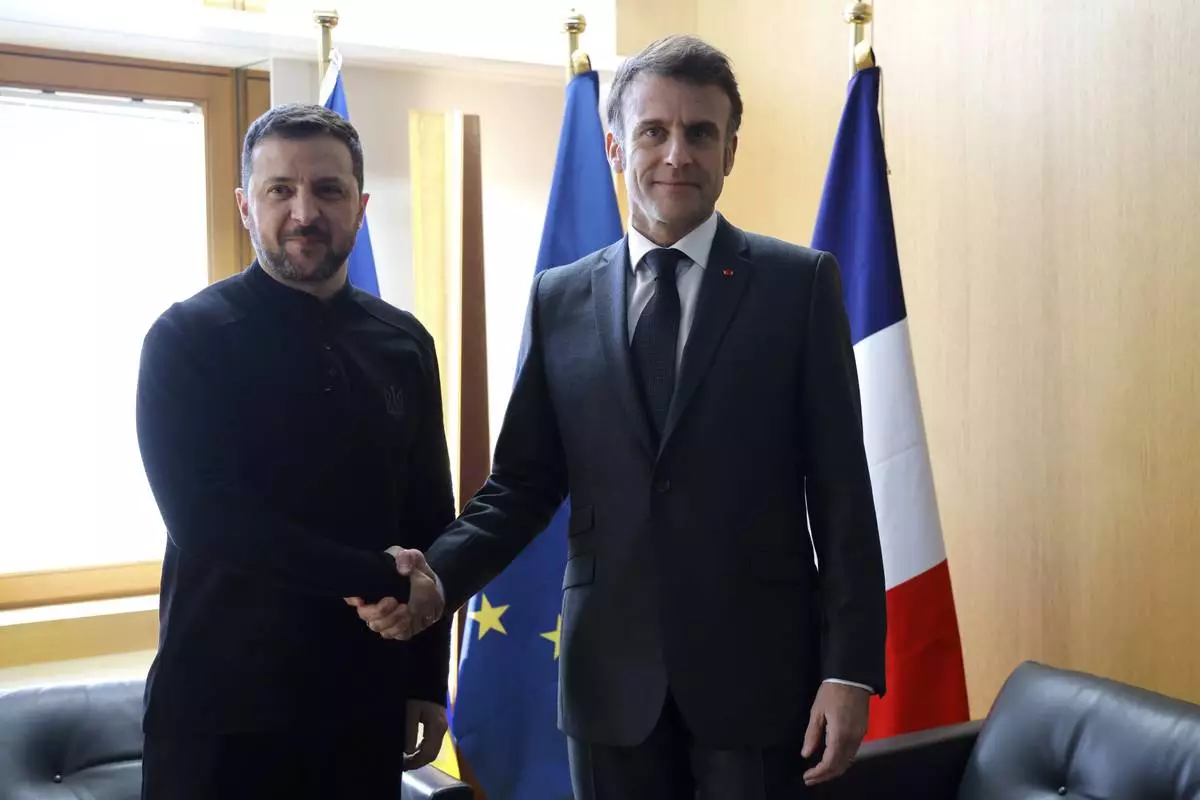
Ukraine's President Volodymyr Zelenskyy, left, meets French President Emmanuel Macron on the sidelines of the European Council to discuss continued support for Ukraine and European defense, in Brussels, Thursday, March 6, 2025. (Ludovic Marin, Pool via AP)
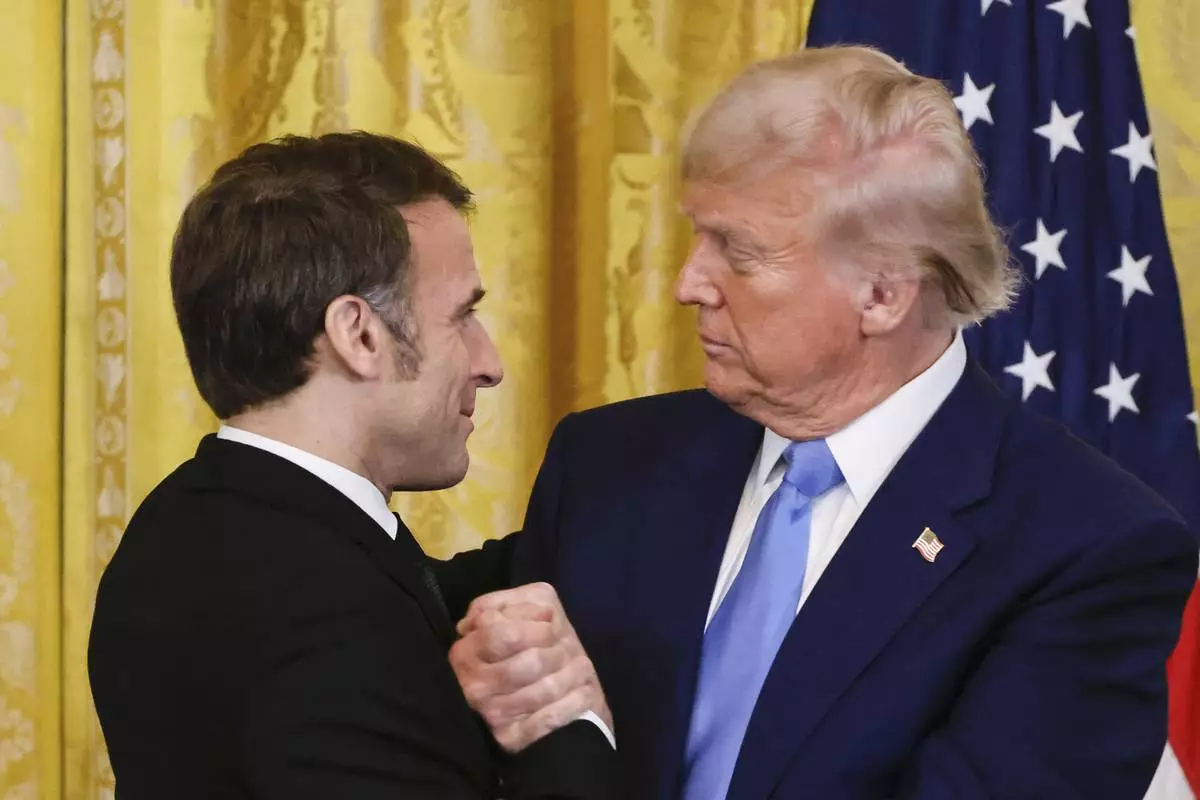
President Donald Trump, right, shakes the hand of France's President Emmanuel Macron during a joint press conference in the East Room of the White House in Washington, Monday, Feb. 24, 2025. (Ludovic Marin/Pool via AP)
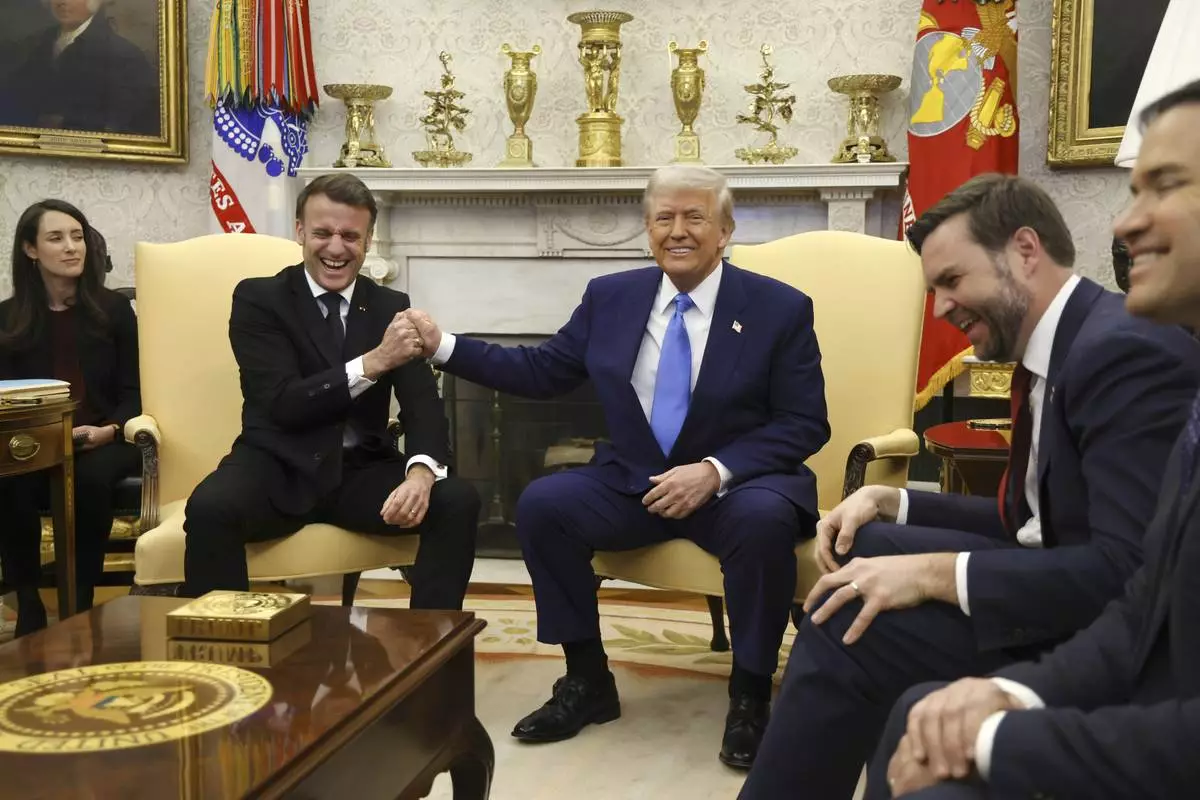
France's President Emmanuel Macron, from second left, speaks with President Donald Trump as Vice President JD Vance and Secretary of State Marco Rubio react during a meeting in the Oval Office of the White House in Washington, Monday, Feb. 24, 2025. (Ludovic Marin/Pool via AP)
PARIS (AP) — For powerful men in France’s film industry, this was a week of reckoning. Gérard Depardieu — the country’s most famous male actor — was convicted of sexual assault. Two days later, the Cannes Film Festival barred another actor accused of rape from walking the red carpet.
Together, the decisions sent a message that France had long resisted: that artistic brilliance may no longer shield those who abuse their power.
For decades, Depardieu was revered as French cinema’s “sacred monster” — a towering talent whose gluttony, volatility and magnetism became part of his myth. With more than 250 films to his name, many believed he would remain untouchable even after more than 20 women accused him of sexual misconduct.
Now, that myth has cracked.
The verdict has revived a broader question France has ducked since the dawn of #MeToo: Can a country that celebrates seduction and irreverence finally hold its male icons to account?
France has long lived its own #MeToo contradiction. That talent, charm, or intellect forgives misconduct. That the art excuses the artist. This is the land that gave the world Brigitte Bardot’s pout and Catherine Deneuve’s poise — and then watched both recoil when the movement came knocking. Deneuve has defended “the right" to seduce, while Bardot has dismissed feminism outright: “I like men.”
But the ground is shifting — fast.
Depardieu was handed an 18-month suspended sentence Tuesday for groping two women on a 2021 film set. He denies the charges and is appealing.
“It’s the end of impunity of artists with a capital A,” Carine Durrieu Diebolt, a lawyer for one of the two women who won their case against Depardieu, told The Associated Press. The verdict represented “a bookend for putting actors on a pedestal because they were talented,” she added.
Two days later, the prestigious Cannes Film Festival barred actor Théo Navarro-Mussy — accused of rape by three former partners — from attending the premiere of a film he stars in, even though the file was dropped for lack of evidence. The women are launching a civil complaint.
Navarro-Mussy denies wrongdoing. His lawyer said that she’s unaware of any ongoing proceedings against him.
What stunned wasn’t just the decision, but who made it. Cannes director Thierry Frémaux had long been seen as emblematic of the old guard. He defended Roman Polanski for years and continued to screen his films despite the director’s 1977 guilty plea in the U.S. for sex with a 13-year-old. In 2018, when asked why Cannes still included Polanski, Frémaux said: “These are complicated matters.”
Frémaux opened 2023's festival with a film starring Johnny Depp, despite the actor’s highly public legal battle with ex-wife Amber Heard over allegations of domestic abuse, in which he was never criminally charged. When asked about the backlash, Frémaux replied: “I only have one rule: it’s the freedom of thinking, and the freedom of speech and acting within a legal framework.”
This week, the rules changed.
“The Cannes decision is of course linked to the Depardieu verdict,” said Céline Piques of Osez le féminisme (“Dare Feminism!”), a group that campaigns against sexual violence. “(They’ve) realized which way the wind is blowing. Frémaux is trying to right the wrongs.”
Not everyone welcomed the verdict — or what followed — as a cultural turning point.
Fanny Ardant, one of French cinema’s grandes dames and a longtime friend of Depardieu, sat on his side in court. She is now directing him in a film in Portugal, despite the conviction.
“Fanny Ardant? She completely missed the point,” said Piques. “She downplayed the violence, normalized it. That’s rape culture, plain and simple.”
Juliette Binoche, Cannes jury president and one of France’s most respected actors, struck a note of restraint: “He’s not a monster. He’s a man — one who has, apparently, been desacralized.”
Her caution captured something deeper: a country caught between the urge to change and the instinct to protect its giants.
In 2024, more than 22,000 rapes were reported in France. Fewer than 3% led to convictions. “The Depardieu verdict shows there’s progress,” said lawyer Anne-Sophie Laguens, who works with victims of sexual assault. “But for most women, the barriers to justice remain enormous.”
When Bertrand Cantat — front man of Noir Désir and once one of France’s bestselling rock singers — launched a 2018 comeback tour, he had served just four years in prison for killing his partner, actor Marie Trintignant, during a violent assault.
Despite public outrage, he returned to the stage and performed.
“That would be unthinkable today,” said Piques. “The public mood has changed. What we tolerate has changed.”
One breakthrough came not from a film set, but an Avignon courtroom. The conviction of 51 men for drugging and raping Gisele Pelicot — a case long ignored despite her pleas — marked a turning point. For years, shame was hers. Now, it belongs to the perpetrators.
“It proved rapists aren’t just strangers in alleys,” said Piques. “They’re husbands. Colleagues. Respected men.”
That shift in shame is now rippling through the cultural world — once seen as a bastion of male privilege. Recently. director Christophe Ruggia was convicted of abusing actor Adèle Haenel when she was a minor, though he is appealing; and actor-director Nicolas Bedos, was sentenced for sexual assault.
Slowly but surely, yes. The system that long protected men like Depardieu is not yet dismantled, but it is shifting.
As one of the actor’s accusers said through tears after the ruling: “I’m very, very much satisfied with the decision. That’s a victory for me, really. And a big progress, a step forward. I feel justice was made.”
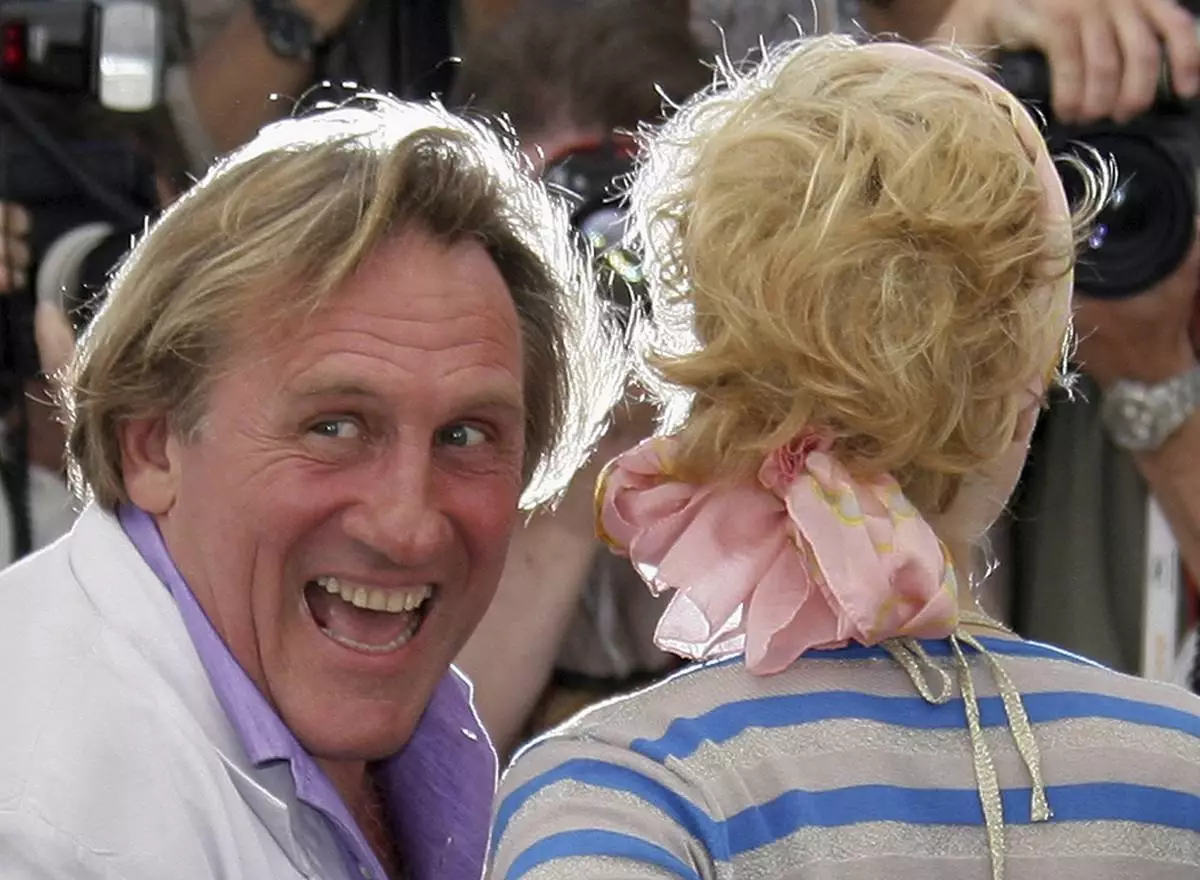
FILE - French actor Gerard Depardieu, left, and Belgian actress Cecile de France pose during a photo call for the film "Quand J'etais Chanteur," at the 59th International film festival in Cannes, southern France, on May 26, 2006. (AP Photo/Francois Mori, File)









